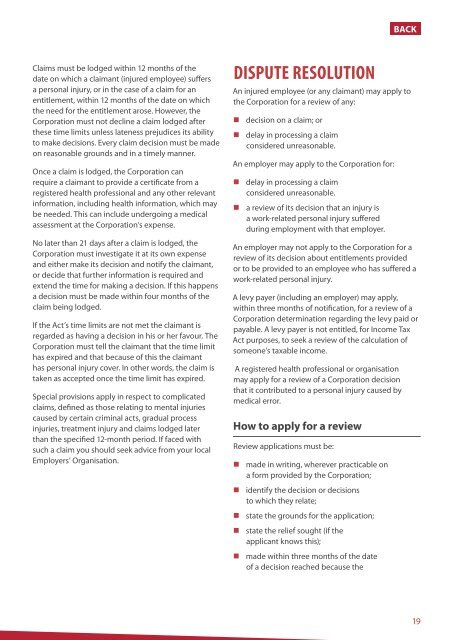004_ACC_April_2016
You also want an ePaper? Increase the reach of your titles
YUMPU automatically turns print PDFs into web optimized ePapers that Google loves.
BACK<br />
Claims must be lodged within 12 months of the<br />
date on which a claimant (injured employee) suffers<br />
a personal injury, or in the case of a claim for an<br />
entitlement, within 12 months of the date on which<br />
the need for the entitlement arose. However, the<br />
Corporation must not decline a claim lodged after<br />
these time limits unless lateness prejudices its ability<br />
to make decisions. Every claim decision must be made<br />
on reasonable grounds and in a timely manner.<br />
Once a claim is lodged, the Corporation can<br />
require a claimant to provide a certificate from a<br />
registered health professional and any other relevant<br />
information, including health information, which may<br />
be needed. This can include undergoing a medical<br />
assessment at the Corporation’s expense.<br />
No later than 21 days after a claim is lodged, the<br />
Corporation must investigate it at its own expense<br />
and either make its decision and notify the claimant,<br />
or decide that further information is required and<br />
extend the time for making a decision. If this happens<br />
a decision must be made within four months of the<br />
claim being lodged.<br />
If the Act’s time limits are not met the claimant is<br />
regarded as having a decision in his or her favour. The<br />
Corporation must tell the claimant that the time limit<br />
has expired and that because of this the claimant<br />
has personal injury cover. In other words, the claim is<br />
taken as accepted once the time limit has expired.<br />
Special provisions apply in respect to complicated<br />
claims, defined as those relating to mental injuries<br />
caused by certain criminal acts, gradual process<br />
injuries, treatment injury and claims lodged later<br />
than the specified 12-month period. If faced with<br />
such a claim you should seek advice from your local<br />
Employers’ Organisation.<br />
DISPUTE RESOLUTION<br />
An injured employee (or any claimant) may apply to<br />
the Corporation for a review of any:<br />
• decision on a claim; or<br />
• delay in processing a claim<br />
considered unreasonable.<br />
An employer may apply to the Corporation for:<br />
• delay in processing a claim<br />
considered unreasonable.<br />
• a review of its decision that an injury is<br />
a work-related personal injury suffered<br />
during employment with that employer.<br />
An employer may not apply to the Corporation for a<br />
review of its decision about entitlements provided<br />
or to be provided to an employee who has suffered a<br />
work-related personal injury.<br />
A levy payer (including an employer) may apply,<br />
within three months of notification, for a review of a<br />
Corporation determination regarding the levy paid or<br />
payable. A levy payer is not entitled, for Income Tax<br />
Act purposes, to seek a review of the calculation of<br />
someone’s taxable income.<br />
A registered health professional or organisation<br />
may apply for a review of a Corporation decision<br />
that it contributed to a personal injury caused by<br />
medical error.<br />
How to apply for a review<br />
Review applications must be:<br />
• made in writing, wherever practicable on<br />
a form provided by the Corporation;<br />
• identify the decision or decisions<br />
to which they relate;<br />
• state the grounds for the application;<br />
• state the relief sought (if the<br />
applicant knows this);<br />
• made within three months of the date<br />
of a decision reached because the<br />
19


